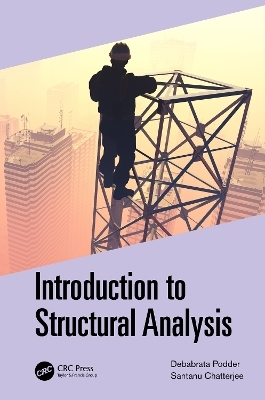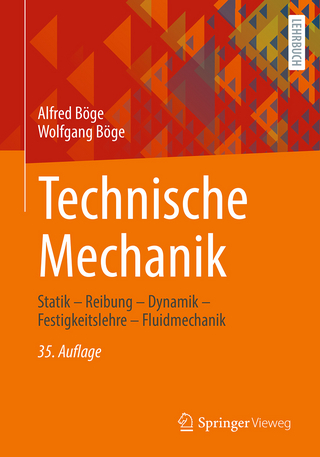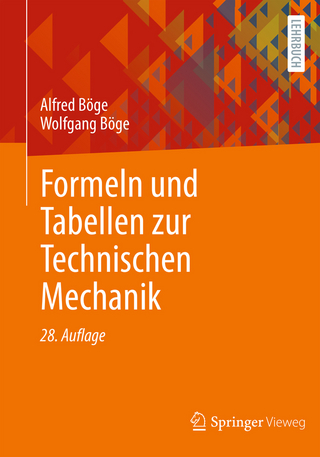
Introduction to Structural Analysis
CRC Press (Verlag)
9780367532734 (ISBN)
Introduction to Structural Analysis covers the principles of structural analysis without any requirement of prior knowledge of structures or equations. Beginning with basic principles of equilibrium of forces and moments, all other subsequent theories of structural analysis have been discussed logically. Divided into two major parts, this book discusses the basics of mechanics and principles of degrees of freedom upon which the entire paradigm rests, followed by analysis of determinate and indeterminate structures. The energy method of structural analysis is also included. Worked out examples are provided in each chapter to explain the concepts and solve real-life structural analysis problems along with a solutions manual. Aimed at undergraduate and senior undergraduate students in civil, structural, and construction engineering, this book:
• Deals with the basic levels of structural analysis (i.e., types of structures and loads, materials and section properties up to the standard level, including analysis of determinate and indeterminate structures).
• Focuses on generalized coordinate systems and Lagrangian and Hamiltonian mechanics as an alternative method of studying the subject.
• Introduces structural indeterminacy and degrees of freedom with many worked out examples.
• Covers fundamentals of matrix theory of structural analysis.
• Reviews energy principles and their relationship for calculating structural deflections.
• Covers plastic analysis of structures.
Debabrata Podder is currently working as an Assistant Professor (CE) at National Institute of Technology Meghalaya, India. He has completed his Engineering education from Jadavpur University and Indian Institute of Technology Kharagpur. After a brief stint as Civil Engineer (S002) at Shapoorji Pallonji & Co. Ltd., Mumbai, he took to academics. He has published one book named as Residual stresses, distortions and their mitigation for fusion welding (ISBN: 978-3-659-94213-6) and papers in several peer reviewed journals. His research interests include welding induced deformations and residual stresses, FEA of structures, theoretical and computational solid mechanics, structural analysis and design. Santanu Chatterjee is a Bachelor of Engineering from Jadavpur University, Kolkata in Construction Engineering and professionally certified from IIT Kanpur on Finite Element Analysis (NPTEL – IIT Kanpur). He has research and industrial experience in the field of Civil/Structural Design Engineering for more than 14 years. He has been also involved in civil design of several solar power plants. He also takes interest in concepts of string theory and quantum mechanics and recently got his paper selected for International Conference on Mathematical Modeling in Physical Sciences (ICM-square 2019 and published in Journal of Physics: Conference Series 1391 (2019) doi:10.1088/1742-6596/1391/1/012066) and one of his papers got awarded as best scientific paper at National Institute of Technology Durgapur (Published in International Journal of Recent Technology and Engineering (IJRTE) ISSN: 2277-3878, Volume-8 Issue-2S7, July 2019), International Conference on renewable energy( ICCARE-2019), India. Presently he is working on development of a calculation tool for transmission line foundation system layout that would enable engineers to draw transmission tower foundation layout with minimal input and compute design quantitates for execution of work.
PART I : Introduction to Structural Analysis, Loads, Material, and Section Properties 1. Introduction to Structural Analysis PART II: Analysis of Statically Determinate Structures 2. Types of Structures and Load 3. Material and Section Properties 4. Basic Concepts of Generalized Coordinates, Lagrangian and Hamiltonian Mechanics 5. Equilibrium and Support Reactions 6. Indeterminacy and Stability of Structure 7. Plane Trusses and Space Trusses 8. Beams and Frames, Shear and Bending Moment 9. Deflections of Beams by Geometric Methods 10. Energy Principles and Deflection of Beam 11. Rolling Loads and Influence Lines and Their Applications 12. Cables, Arches, and Suspension Bridges 13. Analysis of Symmetric Structures PART III: Analysis of Statically Indeterminate Structures 14. Introduction to Statically Indeterminate Structures 15. Approximate Analysis of Statically Indeterminate Structures 16. Method of Consistent Deformations 17. Influence Lines for Statically Indeterminate Structures 18. Slope Deflection Method 19. Moment Distribution Method 20. Kani’s Method or Rotation Contribution Method 21. Column Analogy Method 22. Beams and Frames Having Nonprismatic Members 23. Introduction to Matrix Structural Analysis 24. Introduction to Plastic Analysis of Structure. Appendices. Bibliography. Index.
| Erscheinungsdatum | 05.10.2021 |
|---|---|
| Zusatzinfo | 19 Tables, black and white; 279 Line drawings, black and white; 3 Halftones, black and white; 282 Illustrations, black and white |
| Verlagsort | London |
| Sprache | englisch |
| Maße | 156 x 234 mm |
| Gewicht | 453 g |
| Themenwelt | Technik ► Bauwesen |
| ISBN-13 | 9780367532734 / 9780367532734 |
| Zustand | Neuware |
| Informationen gemäß Produktsicherheitsverordnung (GPSR) | |
| Haben Sie eine Frage zum Produkt? |
aus dem Bereich


